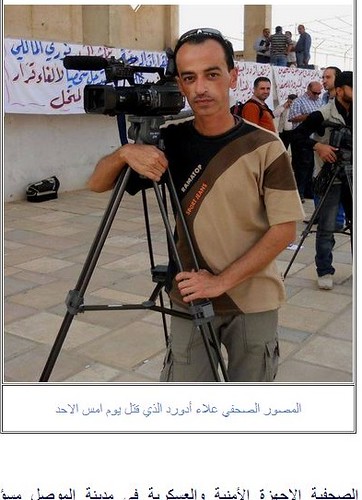
Last week, Alaa Idwar (above) became the latest journalist to be killed in Iraq. Iraq's Journalistic Freedoms Observatory has issued a release on Alaa Idwar.
The JFO noted that they hold military and security forces responsible for not providing security -- not providing security as journalists have faced increasing threats and violence in Mosul for the last two months. They explained that armed forces -- who do not provide their identities -- have also prevented journalists from doing their jobs, interfering with the reporters efforts to report what is taking place. They called for the federal government to conduct an investigation and to do so quickly.
Of Alaa Idhar's murder, they noted his death follows the murder of other journalists in Mosul. He was shot three times -- once in the head, once in the stomach and once in the chest. He wasn't far from his home when the attack took place. Alaa was 41-years-old and had begun his TV journalism career in 1999. In later years, he added photography and frequently free lanced including for Al Jazeera. The JFO noted that security forces found a "liquidation list" containing forty-four names, all of them journalists.
Human Rights Watch observed:
The killings in Mosul have made October and November the deadliest two-month period this year for journalists. Iraqi authorities have released no information about the results of any pending investigations into the killings, nor announced any arrests. The killings follow years of targeted violence against journalists in Iraq. Since the start of protests in Iraq in February 2011 over widespread corruption and lack of services, journalists have faced escalating attacks and threats, including from members of the government’s security forces. According to the Baghdad-based Journalistic Freedoms Observatory, 48 journalists in Mosul have been killed in violence since 2003.
In the latest killing, on November 24 unidentified assailants using automatic weapons shot and killed Alaa Edward Butros, a Christian journalist for al-Rashid television news service, as he sat in a coffee shop in the al-Majmua al-Thaqafeyya area north of Mosul. Gunmen shot and killed three other journalists in Mosul in October. Gunmen also killed two spokespersons for the Ninewa governor, Atheel Nujaifi, one in July and the other in October. Both had previously worked as journalists.
The al-Mada Press news agency, citing a source in the Ninewa police department, reported that security forces had “opened an investigation to find out more details about the assassination and who did it.” So far neither security forces nor the media have provided a reason for the killing. Christians in Mosul are frequently the target of attacks by armed insurgent groups like al-Qaeda.
Ninewa security forces made similar statements after the assassinations of the three other journalists in October, based on Mosul residents’ accounts to Human Rights Watch and local news reports. On October 5, gunmen shot Mohammed Karim al-Badrani, a television reporter working with al-Sharqiyya news service, and his cameraman, Mohammed al-Ghanem, in Mosul’s central al-Sarjakhaneh market when they were reporting on the neighborhood’s preparations for an upcoming religious holiday.
On October 24, gunmen using a silencer shot Bashar Abdulqader Najm al-Nouaymi, a cameraman working with al-Mosuliya news agency, in Mosul’s Nabi Shayth neighborhood.
On October 8, gunmen killed Saad Zaghloul, a spokesman for the Ninewa governor, in front of his home in Mosul’s al-Qadissiya neighborhood. In July, gunmen killed Nujaifi’s spokesman at the time, Qahtan Sami, then laid his corpse on the street while army officers looked on, accordingto a local news report.
Nujaifi told local media that local security forces know the names of members of “a group that specializes in assassinations,” but that he believes the forces have deliberately not taken any action to investigate or prevent the assassinations. A local journalist told Human Rights Watch that according to information a government source provided him, security forces have a list of 44 journalists that armed groups in the area have targeted for assassinations.
